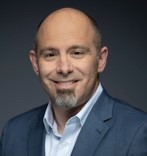Tarik Haydar, PhD, Named Chair of Anatomy & Neurobiology
 Tarik Haydar, PhD, has accepted the position of chair of the department of anatomy and neurobiology, effective Oct. 1, 2024. He will succeed Jennifer Luebke, PhD, who announced last September her intention to step down after six years as chair once her successor was named.
Tarik Haydar, PhD, has accepted the position of chair of the department of anatomy and neurobiology, effective Oct. 1, 2024. He will succeed Jennifer Luebke, PhD, who announced last September her intention to step down after six years as chair once her successor was named.
Haydar received his PhD in physiology in 1997 from the University of Maryland School of Medicine in Baltimore. After postdoctoral training in neurobiology at Yale University School of Medicine, Haydar was appointed assistant professor at George Washington University School of Medicine and Health Sciences in 2002 and established his lab at Children’s National Hospital in Washington, D.C. He was promoted to associate professor with tenure in 2008. He then joined BU as an associate professor in 2010 and was promoted to professor in 2017. In 2020, Haydar moved his lab back to Children’s National to direct the Center for Neuroscience Research.
Haydar’s research focuses on the forebrain, from molecular characterization of progenitors in the fetal brain to understanding how brain circuitry is constructed during development. His lab also studies how changes caused by genetic or environmental anomalies lead to altered brain function, focusing most specifically on Down syndrome. His cellular and molecular studies include delivery of nucleic acids to the fetal and postnatal brain, advanced laser microscopy techniques and single cell/nucleus genomics of mouse and human brain. Recent projects in the Haydar lab also include analysis of 3D forebrain spheroids from patient-derived induced pluripotent stem cells.
In addition to pursuing these basic research goals, Haydar serves multiple roles in research societies focused on brain development and Down syndrome. Throughout his career, Dr. Haydar has served as a standing member and chair of several NIH study sections. He has received funding from multiple NIH institutes, the DANA Foundation and Cure Autism Now, and has published in high-impact journals, including Science, Cell, Neuron, PNAS and Nature Neuroscience.
Haydar has served on many executive leadership committees and has a strong record of faculty mentorship, diversity and inclusion efforts, and growth of the grant funding base of his center.
View all posts